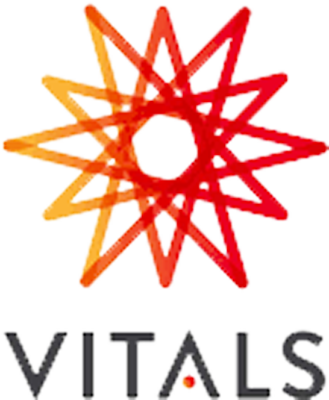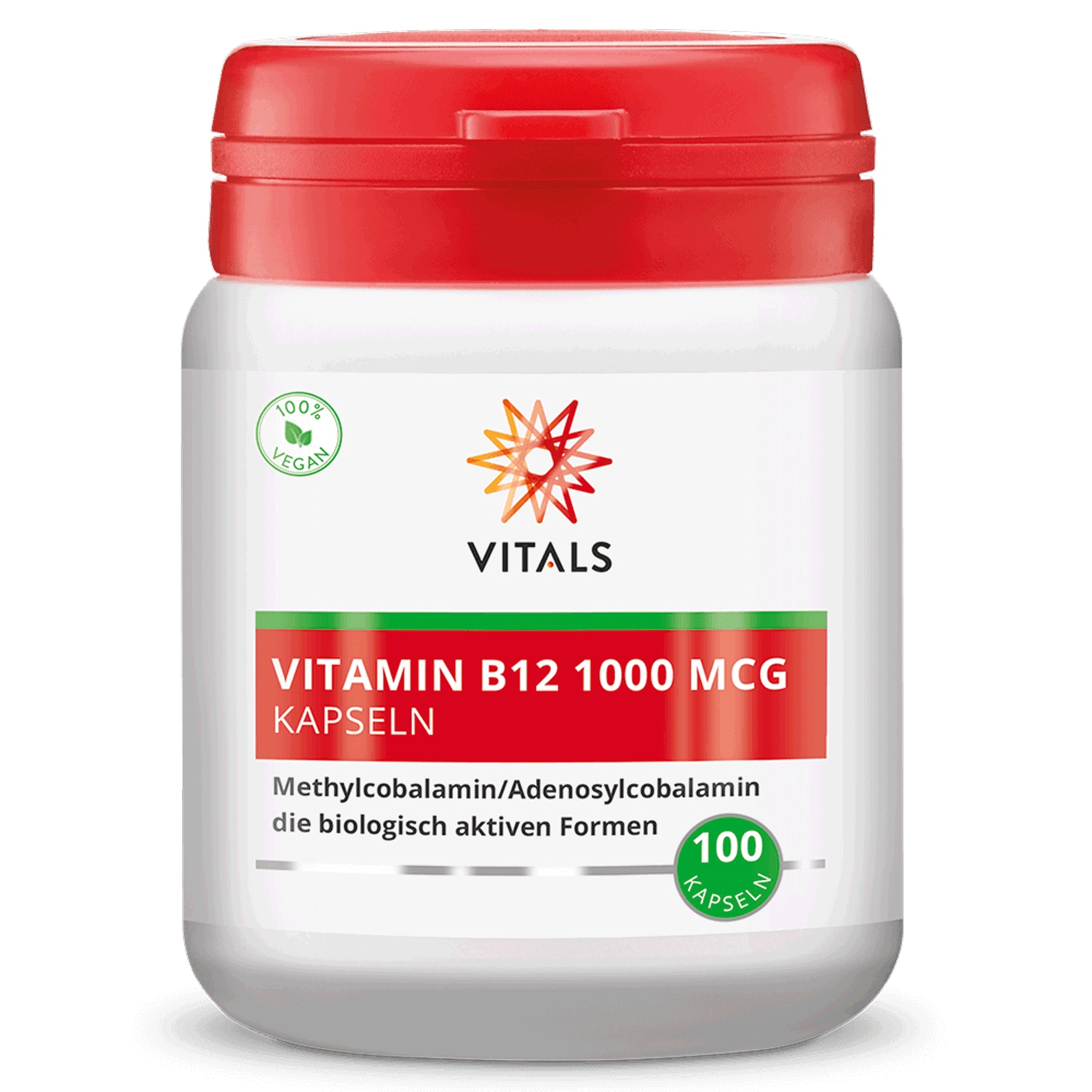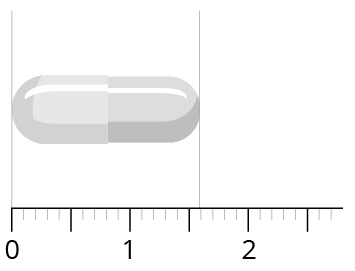Vitamin B12 1000 mcg, 100 capsules

- In the biologically active form of methyl and adenosylcobalamin
- Optimum bioavailability
- Lozenges for absorption via the oral mucosa
| Quantity | Unit price | Base price |
|---|---|---|
| To 1 |
€24.90
|
€996.00 / 1 Kilogramm |
| To 4 |
€23.70
|
€948.00 / 1 Kilogramm |
| From 5 |
€22.40
|
€896.00 / 1 Kilogramm |
Available, delivery time 1-4 days (D), 5-10 days (EU + Intl)
Vitamin B12 in its best forms methylcobalamin and adenosylcobalamin
These are the forms in which vitamin B12 is found in food and used by the body. Cyanocobalamin, a synthetic form of vitamin B12 that does not occur naturally, is used in many other products.
This product is specifically aimed at people who prefer a flavourless and unsweetened B12 capsule food supplement. If desired, the capsule can be opened to sprinkle the powder under the tongue. It is also effective to take the entire capsule, preferably on an empty stomach.
Benefits of biologically active B12
In cases of oxidative stress, supplementation with a reduced form of vitamin B12 (such as methylcobalamin) may be more beneficial than using an oxidised form (such as cyanocobalamin). Studies also suggest that vitamin B12 levels increase more after taking biologically active vitamin B12 than after taking cyanocobalamin. More vitamin B12 is stored in the liver, while less is excreted in the urine (longer half-life). For this reason, bioavailability is higher.
Absorption of vitamin B12
The absorption of vitamin B12 from food is a complex process. In the stomach, vitamin B12 is separated from food proteins and temporarily bound to transport proteins (also known as R proteins or transcobalamin I), which are found in saliva and mucus in the oesophagus and stomach. In the duodenum, the pancreatic proteases (digestive enzymes produced there) break down the vitamin B12 from the R-proteins and bind it to the "intrinsic factor" (IF), a special protein that is produced in the stomach and is necessary for vitamin B12 absorption. In the last section of the ileum, vitamin B12 is absorbed into the enterocytes (intestinal cells) by active transport after it is bound to specific receptors, provided that the vitamin is bound to IF. In the enterocytes, IF is broken down and the released vitamin B12 is bound to the transport proteins transcobalamin I and II. This complex is then released into the blood plasma.
Utilisation of vitamin B12 by the body
20-25% of the vitamin B12 in the blood is bound to transcobalamin II. Only the vitamin B12 that is bound to this protein is absorbed by the body's cells. Transcobalamin II dissolves vitamin B12 in the cell's lysosome and converts it into methyl or adenosylcobalamin (lysosomes are vesicles in the cytoplasm that break down certain substances in order to reuse or excrete them). Methylcobalamin is mainly required in the blood plasma, cytoplasm and cerebrospinal fluid, while adenosylcobalamin is needed in the tissue and mitochondria.
As methylcobalamin (in the cytoplasm), vitamin B12 acts as a cofactor for the conversion of homocysteine to methionine by the enzyme methionine synthase (see Figure 2). Methylcobalamin donates its methyl group to homocysteine, while the remaining cobalamin receives a new methyl group from 5-methyltetrahydrofolate. And then the cycle starts again. This process is also known as (re-)methylation. The main use of methionine is in the production of S-adenosylmethionine (SAMe), the most important methyl donor, which is involved in the synthesis of DNA, RNA, myelin, phospholipids, proteins and neurotransmitters such as serotonin and dopamine. In this way, methylcobalamin can contribute to normal cell division and the formation of red blood cells. It is also necessary for the normal functioning of the brain and nerves and therefore has a positive effect on memory, concentration and mood. Vitamin B12 also has an effect on the activation of certain immune cells and therefore on the normal function of the immune system, as it is involved in DNA and protein synthesis.
Vitamin B12 is present as adenosylcobalamin (in the mitochondria) and is involved in the conversion of methylmalonyl-CoA into succinyl-CoA (see Figure 2). Succinyl-CoA plays a role in the citric acid cycle, a series of biochemical reactions that ensure energy metabolism at the cellular level. Vitamin B12 thus contributes to energy levels and can alleviate fatigue.
Active and passive absorption
Vitamin B12 is absorbed very effectively from food, but the rate of absorption decreases rapidly when the intake of vitamin B12 is increased, as the receptors become saturated. With an intake of a few micrograms of vitamin B12, the absorption rate is between 25 and 65 %, whereas with 25 mcg it is only 5 %. If absorption is not bound to IF, it takes place via passive diffusion* (along the entire gastrointestinal tract). However, this type of absorption is not very effective. If IF is missing, only 1 % of vitamin B12 is absorbed. In addition, vitamin B12 that is not bound to IF is broken down more quickly by proteolytic enzymes and intestinal bacteria. Therefore, normal production and function of IF is very important for active vitamin B12 absorption.
In certain situations, it may be necessary to use a high-dose vitamin B12 supplement (with a dose of 500-2000 mcg) for additional support. A significant proportion of this can be absorbed via passive diffusion, which ensures a sufficient supply of B12. It is advisable to use vitamin B12 together with folate and other B vitamins or a comprehensive multivitamin supplement
Nutritive properties
- Vitamin B12 contributes to normal energy metabolism and has a function in cell division.
- Vitamin B12 contributes to the normal function of the nervous system and to normal mental function.
- Vitamin B12 and folic acid contribute to normal homocysteine metabolism and help to reduce tiredness and fatigue.
- Vitamin B12 contributes to the normal formation of red blood cells and, like folic acid, contributes to the normal function of the immune system.
Nutritional declaration
| Micronutrients | per daily portion of 1 capsule |
| Vitamin B12 | 1000 µg (40000 %*) |
*Reference value according to Regulation (EU) No. 1169/2011
Ingredients
Release agent (rice fibres), vegetable capsule (pullulan, from fermented cassava starch), adenosylcobalamin, methylcobalamin.
Recommended dosage
Take 1-2 capsules per day with water between meals. The capsule can also be opened and the powder sprinkled under the tongue.
Please note
This product does not contain folate or B6, so the use of a multivitamin with folate and B6 in combination with this B12 product remains possible.
Storage instructions
Store in a cool, dry place away from light (not in the refrigerator).
Legal information
The recommended daily intake must not be exceeded. Food supplements are no substitute for a balanced and varied diet and a healthy lifestyle. Store out of the reach of small children.
| Administration: | In vegan capsules. |
|---|---|
| Application: | Immune system |
| Micronutrients: | Vitamin B12 |
| Product Type: | Dietary supplements |
| Quality: | Gluten-free, Lactose-free, Magnesium stearate-free, Vegan |
Vitals, unsere neue Marke ab 2025
Wir sind ständig auf der Suche nach Marken, die unsere Ideale repräsentieren: Höchste Qualität, konsequentes Weglassen überflüssiger Zusatzstoffe wie Titandioxid oder Schweinegelatine, sehr gute Preis-Leistungs-Verhältnis und absolute Zuverlässigkeit bei der Lieferung an uns und damit auch an die Kunden.
Das ist sehr schwer, weil solche Firmen enorm selten sind, unter der Masse an Herstellern von Nahrungsergänzungsmitteln, die inzwischen auf dem Markt sind. Aber wir haben es wieder geschafft, fündig zu werden, mit Vitals aus den Niederlanden!
Anschrift des Herstellers: Vitals Voedingssupplementen BV, Pieter Lieftinckweg 29, 1505 HX Zaandam, Niederlande. E-Mail: kundendienst@vitals.eu.

Login




